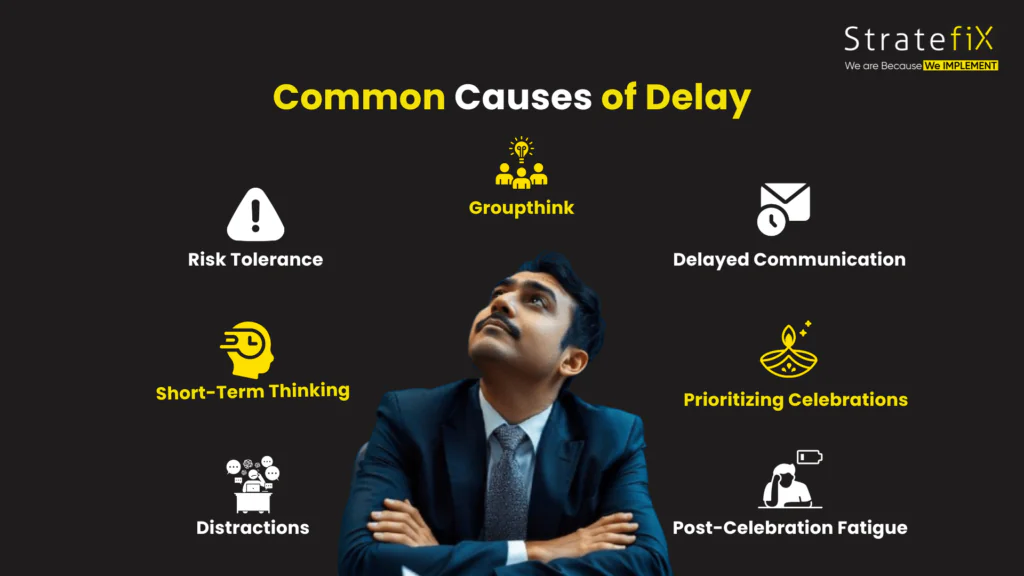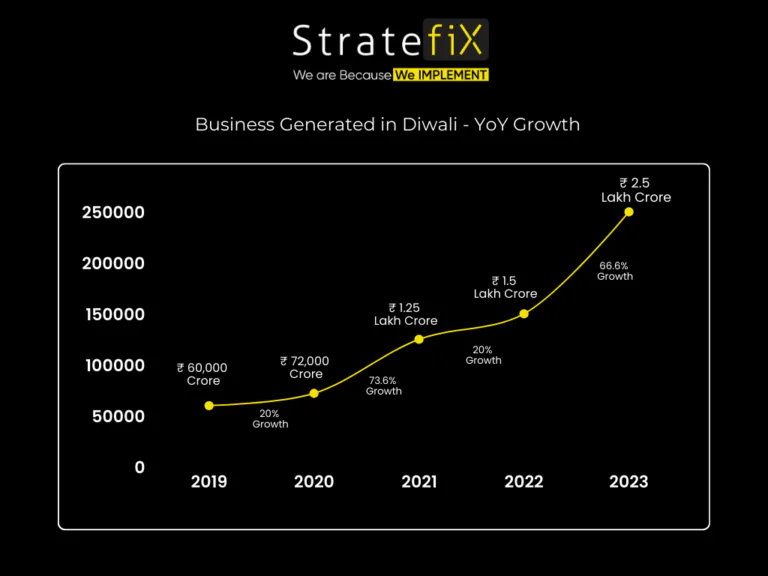Just before “Diwali Duration”, Ask any SME business owners,
- What’s your strategy for scaling up operations during Diwali – are you planning to hire new talent?
- With Diwali around the corner, have you mapped out any major investments?
- Are you planning to launch that new product this quarter?
- Have you thought about boosting your marketing efforts during Diwali?
- What’s your plan for optimizing cash flow and managing expenses?
- As the year winds down, are you focusing on hitting your quarterly targets?
The most common answer will be “Diwali Ke Baad”. It reflects a tendency for businesses to postpone crucial decisions, until the festival ends.
Why Diwali becomes a bottleneck to any new start and critical decisions are delayed until after the celebrations wrap up?

It’s the time of year when India is gearing up for Diwali, and the excitement is palpable, but for many Small and Medium Enterprises (SMEs), this season also brings a tendency to press the “pause button” on key business decisions.
Ask any business owner just before the Diwali season about their plans for the next quarter, the most common response you’ll hear is, “Diwali Ke Baad.”
This phrase has become a default setting for many business owners, reflecting an ingrained habit of delaying important initiatives until after the festivities.
While understandable, this mindset can hold businesses back, leading to missed opportunities and lost momentum.

Why Diwali Becomes a Barrier to New Starts?
For Indian SMEs, Diwali is a peak sales season, with customer engagement at its highest and the opportunity to capitalize on festive spending at its fullest.
Here are some common reasons why Diwali becomes a roadblock for many SMEs:
- Distraction from Day-to-Day Operations: Employees take pre-planned holidays, the focus shifts to bonuses, and the general festive mood leads to a dip in organizational productivity.
- Delayed Payments: Many clients, too, tend to delay payments during this period, adding to financial stress.
- Vendor Pressure: On the flip side, vendors push for quicker payment clearances, tightening cash flow even further.
- The Comfort Zone: Postponing decisions allows business owners to stay within their comfort zone, avoiding risks when the focus is on immediate festive gains.
- Cash Flow Pressures: The period often comes with financial strain, as businesses have to manage bonuses, gifts, and other festive expenses.
Instead of leveraging this time to push forward, many businesses choose to wait until the celebrations are over, potentially hampering their long-term growth.
The Effects of Delayed Decisions - Diwali or Diwala?
The festive period, when managed poorly, can lead to what some entrepreneurs jokingly call “Diwala” (bankruptcy). This occurs when businesses become overly reliant on Diwali sales, neglecting the need for continuous momentum throughout the year. For India’s SMEs, delaying until ‘after Diwali’ is like hitting pause on growth.
Lost Momentum and Missed Opportunities
SMEs that press pause risk falling behind competitors who continue to innovate and move forward during this time. A lack of action means missed chances to launch new products, expand into new markets, or take advantage of seasonal demand.
The Cost of Inaction
Financially, waiting means potential revenue is delayed, and client relationships may suffer if businesses aren’t able to respond quickly to market needs. Operationally, postponing hiring or investment can create bottlenecks later on, making it harder to catch up after the festival ends.
“The market won’t wait, and neither should you!” – Chirag Patel – Co-founder – Stratefix Consulting
Why Business Shouldn't Depend Only on Diwali Sales?
Diwali may be a critical sales period, but it’s not the be-all and end-all for SMEs.
Relying solely on Diwali sales to meet annual targets is a risky strategy. In fact, many businesses see the festive period as a double-edged sword—while sales might peak, operational issues like cash flow management, manpower shortages, and logistical hiccups can easily offset these gains if not handled well.
However, those that plan and prepare ahead of time often see a significant improvement in their Q4 performance, setting them up for a strong end to the year.
A month of inaction means missing out on this vast potential, especially in sectors like retail, textile, e-commerce, and manufacturing where Diwali sales play a crucial role.
One Ahmedabad-based entrepreneur shared his experience with us:
“Every year, I hear from other businesses in my industry that they’ll resume talks or finalize orders ‘after Diwali.’ By the time they’re ready, many of their customers have moved on to more proactive competitors. Last year, we decided to break the ‘Diwali ke baad’ habit, and it worked wonders. We saw a 20% increase in sales during the festive period by staying ahead. With our continued investment efforts, we were able to fulfil BIG orders even post Diwali helping to overachieve our yearly targets by the end of the financial year”
Inaction also means delaying payments from clients, which creates a domino effect. SMEs struggle with working capital and are unable to pay their vendors or invest in raw materials for the next production cycle.
“Success doesn’t wait for the right time—it demands action, even when it feels easier to postpone.” – Christine Kane
Why SMEs Must Stay Proactive Beyond Festive Seasons?
The “Diwali Ke Baad” mindset needs to be challenged. Entrepreneurship isn’t about waiting for the right time—it’s about creating the right time. Here’s why SMEs must stay proactive:
- Consistency is Key: The best businesses don’t wait for the perfect moment to act. They maintain a steady pace of operations and decision-making throughout the year, ensuring that their momentum carries them through festive seasons.
- Plan Ahead: Businesses that plan for Diwali well in advance, whether it’s ramping up production, securing working capital, or preparing sales or marketing strategies, are the ones that thrive during and after the festive period.
- Stay Agile: Flexibility is critical. Businesses should be able to adapt to changes in the market, customer demands, and operational needs, even during Diwali. By staying agile, SMEs can capitalize on opportunities that others may overlook.
“Procrastination is the enemy of success. If you wait for perfect conditions, you will never get anything done.” – Jim Rohn
Breaking the "After Diwali" Habit
Diwali is not a pause button for your business. SMEs must adopt a proactive mindset that extends beyond the festive period. Here’s how to break the “after Diwali” habit:
- Set Clear Goals with No Festive Barriers: Establish business goals that aren’t tied to the Diwali calendar. Focus on quarterly targets that keep the business moving forward, no matter the season.
- Be Opportunistic, Not Seasonal: Don’t let your competitors gain ground while you wait for the festivities to end. Take advantage of every moment, and remember that opportunities don’t take a holiday.
- Prioritize Action Over Delay: Whether it’s hiring, launching a product, or investing in new technologies, don’t let Diwali be the reason you delay. Act now and stay ahead of the curve.
Building the Mindset of "Diwali Ke Pahle"
“Diwali Is Not the End—It’s Just the Beginning!” For SMEs, Diwali should be a time of action, not inaction. The true spirit of entrepreneurship lies in consistency and resilience, not waiting for the right moment.
By staying proactive, making timely decisions, and preparing for the future, businesses can ensure that their post-Diwali period is not a time for catching up, but for pushing ahead.
So, what’s your next move? Don’t wait for “Diwali ke baad”—the best time to act is now.
Stratefix Consulting has been helping SMEs stay proactive and thrive throughout the year, not just during Diwali.
Let’s connect if you are ready to make your mindset “Diwali ke Pahle”
Do not wait; the time will never be ‘just right.’ Start where you stand, and work with whatever tools you may have at your command.” – Napoleon Hill







